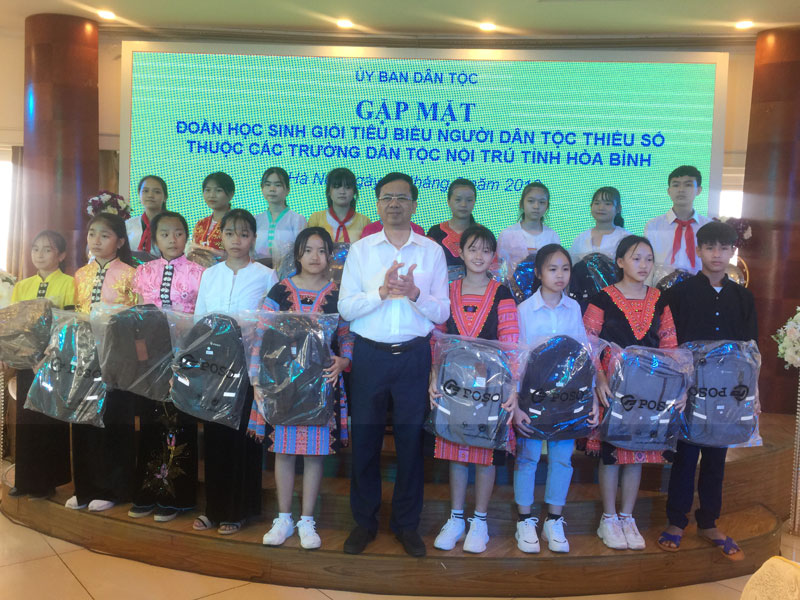
(HBO) – Deputy Minister and Vice Chairman of the Committee for Ethnic Minority Affairs Phan Van Hung recently received a delegation of excellent students from Hoa Binh province’s ethnic boarding schools. The delegation comprised of 50 students and lecturers led by a leader of the provincial Committee for Ethnic Minority Affairs.
 Deputy Minister and Vice Chairman of the Committee for Ethnic
Minority Affairs Phan Van Hung presents gifts to Hoa Binh’s ethnic students
with excellent academic results.
Deputy Minister and Vice Chairman of the Committee for Ethnic
Minority Affairs Phan Van Hung presents gifts to Hoa Binh’s ethnic students
with excellent academic results.
Reporting to Deputy Minister and Vice Chairman of the
Committee for Ethnic Minority Affairs Phan Van Hung, the leader of the
provincial Committee for Ethnic Minority Affairs said during the 2018-2019
school year, the local ethnic education work was strengthened and developed. The
scale of specialised schools remained stable, good teaching and learning
practices were maintained, and education quality improved. The province is home
to 13 boarding and 13 semi-boarding schools which follow curricula set by the
Ministry of Education and Training. At present, the province is fostering
ethnic minority language education for officials and cadres working in remote
and mountainous areas. On September 8, 2016, the provincial People’s Committee issued
the decision approving Muong ethnic alphabet and a plan to use it.
At the meeting, several students, lecturers and the leader
of the provincial Committee for Ethnic Minority Affairs suggested the Committee
for Ethnic Minority Affairs work with ministries, agencies to provide funding
for infrastructure and equipment at schools and increase aid for students at
semi-boarding schools.
Deputy Minister Hung lauded students and lecturers for
overcoming difficulties. He hoped that they will strive to build on the past
achievements and contribute to local development. At the same time, he asked
the provincial Committee for Ethnic Minority Affairs to create favourable conditions
for ethnic and boarding students in the locality.
On the occasion, Hung presented gifts to local ethnic
students with excellent academic results./.
The Standing Board of the Hoa Binh provincial Party Committee met on March 18 to review and guide major investment projects aimed at boosting local socio-economic development.
The air is thick with the hum of drills and the clatter of machinery as the Hoa Binh – Moc Chau expressway takes shape amid the rugged terrain. Welding sparks illuminate the faces of workers, and concrete mixers churn relentlessly, laying fresh pavement on the newly-carved road. The construction site buzzes with a palpable sense of urgency, particularly in Hoa Binh province where the expressway's future is being forged.
The northern province of Hoa Binh, with over 467,000 hectares of natural forest and more than 100,000 hectares of production forest, holds significant potential for carbon credit market development.
Replacing substandard houses with more sturdy ones by June 30 is the direction given by Nguyen Phi Long, alternate member of the Party Central Committee and Secretary of the Hoa Binh provincial Party Committee, at a meeting held in early March by the provincial Steering Committee for the programme to eliminate temporary and dilapidated houses for the needy.
Recognising digital transformation as an inevitable trend, authorities and agencies in Hoa Binh have made great efforts in the work by focusing on three core pillars - digital government, digital society, and digital economy, resulting in enhanced competitiveness, improved investment climate, and ensured economic and social welfare.
In recent years, Da Bac district has improved administrative reform with a one-stop shop mechanism, streamlined inter-agency procedures, and a shift to digital platforms. These efforts have enhanced public service efficiency and contributed to local socio-economic development.



 Deputy Minister and Vice Chairman of the Committee for Ethnic
Minority Affairs Phan Van Hung presents gifts to Hoa Binh’s ethnic students
with excellent academic results.
Deputy Minister and Vice Chairman of the Committee for Ethnic
Minority Affairs Phan Van Hung presents gifts to Hoa Binh’s ethnic students
with excellent academic results.